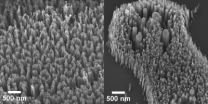(Press-News.org) In 2006, Maria Otilia Carvalho, a researcher from the Tropical Research Institute of Portugal had an ambitious goal: to cut the huge losses of rice – a staple food crop for half of humanity – due to pests, without using toxic pesticides that are increasingly shunned by consumers worldwide. She realised she could not do it alone and turned to EUREKA to support an international collaboration to address a looming threat to world's rice supplies. Harvested rice is constantly under menace from pest insects and fungi - to avoid the pests, farmers and producers treat the rice with chemical pesticides, which leave residue on rice, potentially harming rice workers and consumers. Even the bigger problem is that insects are developing resistance to chemicals, slowly rendering it useless.
Carvalho was one of several scientists scattered around the world who were working on alternative, eco-friendly methods to protect rice in storage. None of the methods on their own could match the effectiveness of chemicals, but Carvalho thought that pulling them all together into one 'integrated pest management' system might wean the industry of pesticides and provide a safer, cleaner food product for the world's market.
She decided to bring researchers from Portugal, Spain, Germany, Greece, Israel and the USA together to find a sustainable, long term solution for the problem. She was awarded a EUREKA grant in 2006 for a project that involved rice farmers and scientists to find a more eco-friendly way to protect rice and other crops. Five years later, the solution they developed is already being put to use in India, and other developing countries are considering adopting the new system as well.
A Rising demand
"This sort of research takes a long time, sometimes a lifetime," says Shlomo Navarro, a collaborator on the project and an entomologist at Food Technology International Consultancy Ltd., in Israel. "The EUREKA grant offered a tremendous opportunity to bring together the different research groups that were working on this problem separately and speed up results."
Rice is the staple food for around half of the world's population; three billion people depend on rice for their subsistence, according to the United Nations Food and Agriculture Organization (FAO). Most of the world's rice production is consumed in the developing world: Asia, Latin America and Africa.
As the world's population grows there is a rising demand for rice to ensure food security especially in Africa and the Latin American and Caribbean regions. The International Rice Research Institute estimates that an additional 8-10 million tonnes of rice will have to be produced each year. Another way to increase the amount of rice reaching people is to reduce the damage and waste caused by insect infestation, as this EUREKA project did.
Finding marketable solutions
And while the global demand for rice is growing, one of the main challenges is to protect it from pests during storage. "We designed a novel way to manage pests using technologies that are sustainable, environmentally and user-friendly," she says. "We did this to protect the quality of rice avoiding the use of polluting chemicals that leave residues on rice – something that has been common so far."
When Carvalho's team tested the integrated system, they found that the amount of rice that had to be thrown away as a result of fungi and insect infestation dropped by more than 95%. Not only did less rice go to waste, but consumers were happier with a product that had not been chemically treated. Rice that has been stored using the integrated system is given the EUREKA stamp of approval: a seal on the product packaging to tell consumers that the product is the outcome of European research. So far four companies are using the technology.
Navarro says that their integrated approach has three key benefits for the European Union market: "improved quality, no infestation and no chemicals on the rice". "Our rice is cleaner than anything else on the market ... We are now in a position to be able to tell the rice industry: 'listen, you should stop using chemicals'," says Navarro.
Helping African farmers
The integrated approach involves three key technologies: electronic insect traps that allow growers to estimate the number of insects in rice storage silos, aeration or refrigeration of silos to delay insect development, and 'modified atmosphere' with the use of carbon dioxide or nitrogen gas, again to slow down pest development. "The main novelty of this project is that it brings the different technologies together," explains Navarro." And the approach can be used for other grains as well, not just rice, he adds. "The electronic insect traps are our eyes inside the storage silos", he says. He is planning to automate the traps so each time an insect is trapped, the storage manager will be alerted by a text message.
Apart from India, other developing countries that could increase the quality of their rice and reduce losses to pests, such as Argentina, Brazil and Mozambique, are also considering adopting the new system. And Navarro says that the researchers will not stop there, as he is planning to bring the idea of modified atmosphere inside storage units to farmers in Kenya.
The system could eventually help small-scale farmers in Africa get better price for their crops as well. Shlomo Navarro is working with subsistence farmers who consume most of their product themselves, encouraging them to store their excess rice within their community until the price if profitable instead of selling it at the same time immediately after the harvest as everyone else, when the market price is the lowest."
INFORMATION: END
The psychological impact of natural disasters such as the Japan earthquake can be revealed in the way people inherently respond to unpredictable situations, according to a psychology expert at Queen Mary, University of London.
Dr Magda Osman, Psychology Lecturer at Queen Mary, University of London, and author of Controlling Uncertainty: Decision-making and Learning in Complex Worlds, said the disaster had a devastating immediate effect on tens of thousands of people in Japan but the true psychological impact will be felt "for some time to come".
"A disaster like the ...
A new plant species is providing an insight into how evolution works and could help improve crop plants, scientists have revealed.
The new plant species, Tragopogon miscellus, appeared in the United States 80 years ago. It came about when two species in the daisy family, introduced from Europe, mated to produce a hybrid offspring.
The species had mated before in Europe, but the hybrids were never successful. However in America something new happened. The number of chromosomes in the hybrid spontaneously doubled, and at once it became larger than its parents and quickly ...
eMaint Enterprises, headquartered in Marlton, New Jersey has provided maintenance management software solutions since 1986. Dedicated to successful CMMS implementation, eMaint is pleased to be a contributing sponsor of the CMMS-2011 Computerized Maintenance Management Summit, a learning and networking event designed for those seeking to implement a new CMMS/EAM or reimplement an existing CMMS/EAM for more effective maintenance management and decision support. The Summit will take place at the Reliability Performance Institute in Fort Myers, Florida on April 11 - 13, 2011.
eMaint's ...
A study by the Complutense University of Madrid (UCM), analysing the impact of the labour reforms introduced over the past 30 years and the living conditions of new generations, asserts that these reforms have been the origin and cause of the current development model based on the exploitation of young people.
"The study indicates that the Spanish economic development model over the past three decades – with high rates of economic growth and job creation – is based on the 'over-exploitation of the youngest generations of workers'", Pablo López Calle, author of the paper, ...
The tendency to perceive others as "us versus them" isn't exclusively human but appears to be shared by our primate cousins, a new study led by Yale researchers has found.
In a series of ingenious experiments, Yale researchers led by psychologist Laurie Santos showed that monkeys treat individuals from outside their groups with the same suspicion and dislike as their human cousins tend to treat outsiders, suggesting that the roots of human intergroup conflict may be evolutionarily quite ancient.
The findings are reported in the March issue of the Journal of Personality ...
Carbon nanofibers hold promise for technologies ranging from medical imaging devices to precise scientific measurement tools, but the time and expense associated with uniformly creating nanofibers of the correct size has been an obstacle – until now. A new study from North Carolina State University demonstrates an improved method for creating carbon nanofibers of specific sizes, as well as explaining the science behind the method.
"Carbon nanofibers have a host of potential applications, but their utility is affected by their diameter – and controlling the diameter of ...
Badbeat.com, the original and leading online poker staking business, will be donating 10% of ALL affiliate revenue generated by the Badbeat players on Friday 18th March to Comic Relief in support of Red Nose Day.
The Badbeat management has urged their players to help change lives both in the UK and across Africa, challenging them to raise as much money as possible playing poker day and night!
"Red Nose Day is a day like no other; when the whole country gets together to help change countless lives," said Badbeat Managing Director, John Conroy. "We're incredibly happy ...
MIAMI – March 17, 2010 -- University of Miami (UM) Rosenstiel School of Marine & Atmospheric Science scientist Chris Langdon and colleagues developed a new tool to monitor coral reef vital signs. By accurately measuring their biological pulse, scientists can better assess how climate change and other ecological threats impact coral reef health worldwide.
During a March 2009 experiment at Cayo Enrique Reef in Puerto Rico, the team tested two new methods to monitor biological productivity. They compared a technique that measures changes in dissolved oxygen within ...
Using skin cells from adult siblings with schizophrenia and a genetic mutation linked to major mental illnesses, Johns Hopkins researchers have created induced pluripotent stem cells (iPS cells) using a new and improved "clean" technique.
Reporting online February 22 in Molecular Psychiatry, the team confirms the establishment of two new lines of iPS cells with mutations in the gene named Disrupted In Schizophrenia 1, or DISC1. They made the cells using a nonviral "epiosomal vector" that jumpstarts the reprogramming machinery of cells without modifying their original ...
Researchers at the University of Granada have proved that neuropsychological rehabilitation helps in significantly reducing cognitive, emotional and behavioural after-effects in patients with acquired brain injury, generaly due to traumatic brain injury and ictus. These patients should not wait to be treated later by the social services, since early intervention (within six months after the traumatism) reduces further after-effects.
Despite the prevention campaigns launched for reducing traffic accidents and improving heart-friendly habits, traumatic brain injury and ...




